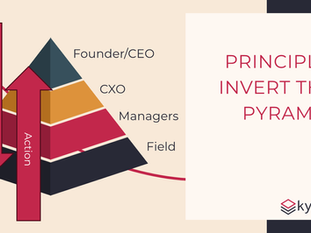
Climbing out of Silos We all know silos – not the ones that hold grain, but the ones that emerge when there are different lines of business or stakeholders in an operation and each is solely focused on its own objectives.
Silos tend to emerge as an unintended consequence of narrow KPIs. If you have a team, how do you measure their performance? Is it the immediate measure (how many invoices are closed in a month?) or the wider corporate outcome (the balance of accounts receivable at the end of the year)? Most organizations tend to measure the more immediate impact, as it's easier to capture, directly motivates an employee (they see exactly what they need to do to "succeed") and allows for departmental Profit and Loss (P&L) measurements. A silo is an unintended consequence of a well-defined job description. Ironically, individual silo success might lead to overall organizational decline.

Working in silos is a problem so prevalent in large organizations that most leaders will have to tackle it at one point or another. I certainly have. The following tactics have helped me and will hopefully help you too:
1. Encourage individuals to climb out of the silo. If we take the metaphor further and think of the organization as a field of silos, the first step is to climb out and see the whole field. Climbing out of the silo means understanding not just how your team is measured, but how it contributes to the overall success of the organization. Helping your team understand where they fit in the overall picture helps them see how sticking to small details or insisting on "doing their job" might actually hurt the overall organizational outcome. That big picture is often missing, and it needs to be explained over and over, with emphasis at every step of success.
2. Allow teams to peer into other silos. While every team contributes to organizational success, no team is solely responsible for it. Seeing what other teams do, how they do it, how they're measured, etc. brings a sense of camaraderie and understanding that no amount of KPI setting can. It converts the conversation from "that team always does this" to "in this situation, person abc did that because x". It changes relationships and interactions from blackbox input/output flows to more human understanding.
3. If you're wheat, try thinking like barley. This is about inviting teams to think about how they can make the lives of other teams easier. In most corporate environments, work tends to happen in steps/deliverables/outcomes that are handed over from one team to another. If we can imagine what the other team needs to succeed and how they do their jobs, we can start to imagine the steps we need to take to make it easier for them. Conversely, what small change can the other team make to make our lives easier? Better yet: xix wheat and barley: simply allow people from one team to shadow/observe other teams. I've found that official "job exchanges" are most effective, but even a shadow/”day in the life” exercise will help teammates open their eyes to how other people work.
4. Setup red phones between silos. At one point in the cold war, to avert accidental nuclear war, an emergency "red phone" communication channel between the US & USSR leadership was set up where they could immediately and directly speak to each other during a crisis*. No matter how well intentioned we all are, miscommunications and conflicts will arise, and instead of the typical escalation (going up the management tree or putting people on CC), having individuals sort it out 1:1 really helps sort out some of these problems. These "red phones" are trusted individuals in each team/silo who are not necessarily the most senior but tend to understand the processes best and are good communicators. Modern, large organizations can't operate without some level of specialization. Focusing on one task allows an individual (and by extension, their team) to become better at what they do and is a definite competitive advantage. With this in mind, I don't think we need to do away with specialization altogether, but we do need to be vigilant of the side effects; in this instance, silos. If the vision is clear and communication is encouraged, working in silos doesn’t have to be the default way organizations operate.
How are you helping your team climb our of silos in your org?






